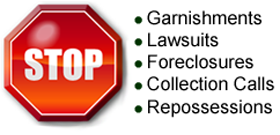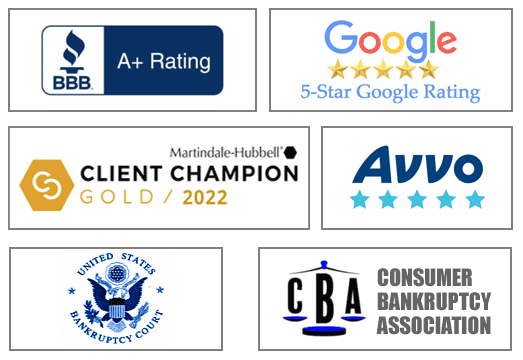Which Bankruptcy Chapter Is Right for Me?
Most personal bankruptcies filed in the U.S. are Chapter 7 or Chapter 13. Business bankruptcies fall under Chapter 11.
Whether Chapter 7 or Chapter 13 Bankruptcy is right for you depends on:
- Your earnings or other income,
- The value of your assets (home, cars, bank accounts, etc.),
- The amount of your debts (credit cards, medical bills, loans, other),
- The type of debts (car note, mortgage, utility bills, loans, etc.),
- Your short-term and long-term financial goals.
The best way to determine which bankruptcy chapter is right for your individual situation is to discuss your case with an experienced bankruptcy lawyer. However, our experienced bankruptcy lawyers have set forth a few of the main differences between Chapter 7 and Chapter 13, below.
Chapter 7 Bankruptcy
“Liquidation” Wipes Out Debt
Chapter 7 is a “liquidation” bankruptcy designed to completely “wipe out” all of your unsecured debts – such as credit cards and medical bills. The only “re-payment” of these debts will come if you have any assets worth selling. Your sellable assets are “liquidated”, the creditors are paid from the proceeds of the sale and the rest of the debt is completely “discharged.”
Certain assets are “exempt” from being sold (such as a home, car and personal affects). If you don’t have any non-exempt assets to sell, your creditors receive nothing. Therefore, Chapter 7 bankruptcy is usually best for low income debtors with little or no assets who want to get rid of their unsecured debts.
To qualify for Chapter 7 bankruptcy, you also must have little or no disposable income. If you make too much money, the Bankruptcy Court will require you to file a Chapter 13 Bankruptcy instead.
Chapter 13 Bankruptcy
“Payment Plan” Keeps Your Assets
Chapter 13 Bankruptcy is also called “Wage Earner Bankruptcy” or “Reorganization Bankruptcy.” Chapter 13 Bankruptcy is designed for individuals (or married couples) with an income who want to keep their property, by paying back their creditors over time.
Instead of requiring the debtor to sell his or her property to pay creditors as in Chapter 7, Chapter 13 allows the debtor to enter into a “payment plan” to repay creditors over time – usually three to five years. Unlike Chapter 7, the debtor does not receive an immediate discharge of debts and must complete the payments required under the payment plan before a discharge is received.
Chapter 13 offers a number of advantages over Chapter 7. Chapter 13 offers individuals an opportunity to save their homes from foreclosure. By filing under Chapter 13, individuals can stop foreclosure proceedings and may “catch up” on mortgage payments over time – while Chapter 7 bankruptcy only delays foreclosure.






